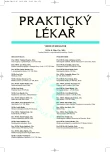Comments from healthy people that may stress patients
Výroky zdravých, které mohou pacienta stresovat
Článek se zabývá stresovou reakcí pacienta na různé nevhodné výroky zdravých o jejich nemoci. Ty vycházejí zejména z nepochopení a neznalosti průběhu potíží a jejich reakcí na různé zátěže nemocného. Subjektivní zkušenost pacienta (stonání) se nekryje vždy s vědeckým pojmem nemoci či diagnózy. Zdravý pak nemocnému nerozumí. To vede často k podceňování a k stereotypním způsobům odpovědi na nemoc pacienta, zejména u psychosomatické nebo méně jasné nemoci. Stresové reakce jsou ovlivněné osobností pacienta, jeho temperamentem, zážitky z dětství, situací v rodině, aktuálním stavem, smyslem života. Důležité je pochopení životního příběhu pacienta v jeho individuální biopsychosociální podmíněnosti.
Klíčová slova:
psychosomatická medicína, komunikace zdravý a pacient, stonání a nemoc, životní příběh, biopsychosociální přístup
Authors:
F. Irmiš
Authors‘ workplace:
Psychiatrie a psychosomatika
; Praha
5
Published in:
Prakt. Lék. 2006; 86(12): 695-697
Category:
Of different specialties
Overview
The article deals with stress reactions of patients induced by uncalled-for comments from healthy people about a patient’s illness. They mainly result from incomprehension and ignorance about the course of a disorder and its reaction to various forms of patient’s stress. Apatient’s subjective experience is not always identical to the scientific definition or diagnosis of a disease. A healthy person then does not understand the sick one. This often leads to an underestimation and to stereotypical patterns of response to patient’s illness, especially in psychosomatic and other less clear diseases. Stress reactions are influenced by a patient’s personality, his/her temperament, childhood experiences, family situation, current status, and purpose in life. It is important to comprehend a patient’s life story in its individual biopsychosocial conditionality.
Key words:
psychosomatic medicine, healthy person and patient communication, illness and disease, life story, biopsychosocial approach.
Labels
General practitioner for children and adolescents General practitioner for adultsArticle was published in
General Practitioner

2006 Issue 12
- Advances in the Treatment of Myasthenia Gravis on the Horizon
- Hope Awakens with Early Diagnosis of Parkinson's Disease Based on Skin Odor
- Memantine in Dementia Therapy – Current Findings and Possible Future Applications
- Memantine Eases Daily Life for Patients and Caregivers
- Possibilities of Using Metamizole in the Treatment of Acute Primary Headaches
-
All articles in this issue
- Role of coronary calcium scoring in a spectrum of examination procedures
- Restoration of hand movement following irreparable radial nerve palsy
- Prevalence and longitudinal trends in prescription of potentially inappropriate medications for the elderly in the Czech Republic
- Family structure and life style of Czech children
- Reasons for admission into old people’s homes.
- Hyperhomocysteinemia and ischemic stroke
- Stem cells in patients with heart failure following myocardial infarction
- Occupational viral hepatitis in southern Moravia from 1988 to 2004
- Comments from healthy people that may stress patients
- Neurosyphilis
- Choroidal detachment as a first sign of a haematological malignancy
- Benign paroxysmal positioning vertigo - a diagnostic problem?
- Severe lactic acidosis associated with acute renal failure in a diabetic patient treated with metformin – A case study.
- Is diagnosis of lyme borreliosis still difficult?
- General Practitioner
- Journal archive
- Current issue
- About the journal
Most read in this issue
- Severe lactic acidosis associated with acute renal failure in a diabetic patient treated with metformin – A case study.
- Role of coronary calcium scoring in a spectrum of examination procedures
- Restoration of hand movement following irreparable radial nerve palsy
- Neurosyphilis
